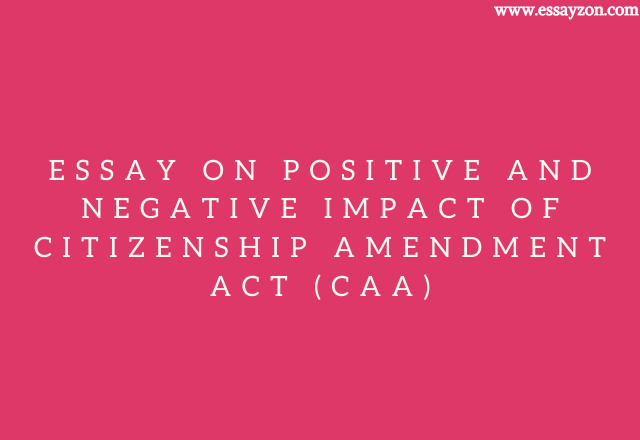The Citizenship Amendment Act or CAA was passed by both the legislatures of the Indian Parliament (Lok Sabha, and Rajya Sabha) in December 2019. This act pursues to alter the characterization of unlawful immigrants for Sikh, Hindu, Buddhist, Christian, and Parsi immigrants from different countries such as Afghanistan, Bangladesh, and Pakistan who have stayed in India without legal documentation. Violent objections have broken out throughout the country against the CAA Act 2019. Let us know more about it and how does it affect the country.
What is CAA Act?

As per the amended Act, all those people belonging to Hindu, Jain, Sikh, Parsi, Christian, and Buddhist communities who have arrived to India from neighboring countries like Pakistan, Afghanistan, and Bangladesh till Dec 31, 2014 and are suffering from religious persecution are not going to be considered as “illegal immigrants”.
They will be provided fast track Indian citizenship in 6 years. According to this Act, the refugees of all these 6 communities will be granted Indian citizenship after staying in India for 6 more years (a total period of residence of 11 years), as against the earlier requirement of twelve years.
Positive Impact of CAA
Protects religious minority groups
The provisions stated under CAA declares India to be a welcome shelter for various prominent religious communities. It pursues to legally establish Muslims as 2nd class citizens of the country by offering them favored treatment to other groups.
This legislation is applicable to all those who are “compelled, or forced to pursue shelter in the country due to oppression on the religious ground. The act aims to safeguard such people from further proceedings of illegitimate migration.
Provides Citizenship to illegal migrants
The beneficiaries of this Act have the freedom to reside in any corner of the country. The burden of persecuted migrants is going to be distributed by the entire nation. Presently, the Indian Constitution offers citizenship by naturalization for those who have stayed in India for the last 11 years. The Act also provides Indian citizenship to those immigrants whose parents or grandparents were born in India.
Eases the process to get Indian citizenship for illegal immigrants
Citizen Amendment Act, updates the present Citizenship Act 1955 to offer the acquisition as well as determination of Indian citizenship for a specific class of illicit immigrants. In addition to this, the Act relaxes the citizenship criteria for these illegal immigrants and combines the groups of Overseas Citizen of India, and Persons of Indian Origin.
Negative Impact of CAA
No provision for Muslim sects
The Act seeks to modify the description of illegal migrants but doesn’t have any provision for Muslim communities such as Ahmedis, and Shias who suffer from persecution in Pakistan. So, the act does not protect all religious communities. The government replies that Muslims can take refuge in Islamic countries, but hasn’t given a clear reply on these issues.
Encourage illegal activities in North East nations
The Citizenship Amendment Act exempts a few regions in the North-East India such as the tribal regions of Meghalaya, Assam, Tripura, and Mizoram. This implies that Arunachal Pradesh, Mizoram, Nagaland, the entire Meghalaya, few areas of Tripura, and Assam would remain out of the scope of the Act.
In this way, the Act goes against the linguistic, and cultural identity of the natives. As Mizoram and above stated northeastern states have a wide indigenous community, execution of the Act will pave the path for the entry of illegal immigrants in those regions.
The protests have originated from the terror that unlawful Bengali Hindu refugees from Bangladesh, if legalized under CAA Act, will impend linguistic, and cultural identities of the Assam state.
Nullifies NRC
Opposition parties, that includes the All India United Democratic Front, and the Congress opposes granting citizenship to people on the sole basis of religion. According to them, if this bill is executed it will invalidate the updated NRC, or National Registration of Citizenship.
Against the Constitution
The Opponents of the CAA states that the bill violates the Indian Constitution. It discriminates Muslims and also disrupts their right to equality as treasured in the Constitution. This Act is not worthy of getting executed as it bypasses the democratic principles of India.
Against the Law of Equality
CAA Act also violates the Article 14 of Indian Constitution, that implies the basic “right to equality” to everyone. The fundamental Constitutional structure can’t be redesigned by any law. Execution of CAA Act discriminates and violates the right to equality.
Against Secularism
The illegal immigrants are to be qualified for the citizenship only on the grounds of religion. This requirement is against one of the fundamental beliefs of the Constitution of India i.e., secularism. Moreover, the haphazard merging of the PIO, and the OCI leaves loopholes in the stating their position as an “Indian citizen”.